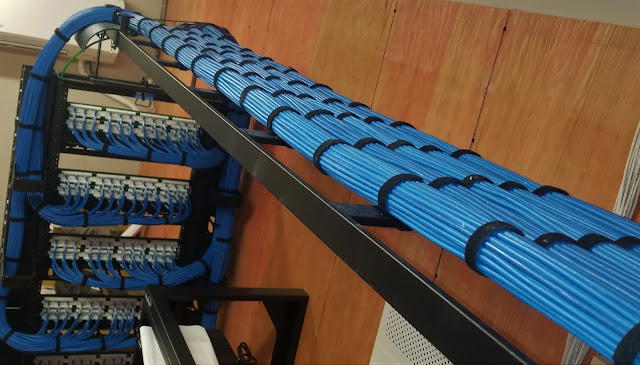Unleashing the Power of Structured Cabling: Simplifying Network Infrastructure
In the digital
age, a robust and reliable network infrastructure is crucial for businesses to
thrive. Structured cabling provides the foundation for efficient data
transmission, seamless connectivity, and scalable network growth. In this
article, we will explore the significance of structured cabling and its role in
simplifying network infrastructure. From its benefits to best practices, we'll
uncover why structured cabling is a must-have for modern businesses.
1.
Understanding Structured Cabling:
Structured
cabling is a standardized approach to designing and installing a comprehensive
network infrastructure. It involves the use of organized and structured wiring
systems that support multiple data and voice services. By creating a unified
system, structured cabling simplifies network management, reduces downtime, and
enables seamless communication.
2. The Benefits
of Structured Cabling:
Structured cabling
offers numerous benefits to businesses of all sizes. It provides a future-proof
infrastructure that supports high-speed data transmission, allowing for the
seamless integration of new technologies and applications. With structured
cabling, businesses experience improved network performance, scalability,
flexibility, and reduced maintenance costs.
3. Components
of Structured Cabling:
To build a
reliable structured cabling system, several components come into play. These
include horizontal cabling, vertical cabling, telecommunications rooms, patch
panels, data racks, and cable management systems. Understanding the purpose and
proper installation of each component is essential for maximizing the benefits
of structured cabling.
4. Design and
Installation Best Practices:
Proper design
and installation are crucial for a successful structured cabling system. This
section will cover essential best practices, such as adhering to industry
standards, carefully planning cable pathways, labeling cables for easy
identification, implementing proper grounding and bonding techniques, and
conducting thorough testing and documentation.
5. Upgrading to
Structured Cabling:
For businesses
with existing network infrastructures, upgrading to structured cabling can
bring significant advantages. This section will discuss the considerations and
steps involved in upgrading from legacy systems to structured cabling,
including assessing current infrastructure, planning for scalability, and
partnering with experienced cabling professionals.
6. Structured
Cabling for Different Environments:
Structured
cabling solutions are applicable to various environments, including office
buildings, data centers, educational institutions, healthcare facilities, and
manufacturing plants. This section will explore how structured cabling
addresses the specific needs and challenges of different environments,
highlighting its adaptability and versatility.
7. Structured
Cabling Maintenance and Troubleshooting:
Regular
maintenance and prompt troubleshooting are essential for ensuring the longevity
and reliability of a structured cabling system. This section will provide
practical tips for maintaining structured cabling, performing routine
inspections, addressing common issues, and partnering with qualified
technicians for complex troubleshooting.
Structured
cabling forms the backbone of modern network infrastructure, enabling
businesses to meet the demands of the digital era. With its benefits of
improved performance, scalability, and flexibility, structured cabling
simplifies network management and future-proofs businesses for technological
advancements. By investing in a well-designed and properly installed structured
cabling system, businesses can unlock the full potential of their networks and
stay ahead in the fast-paced world of connectivity.



Comments
Post a Comment